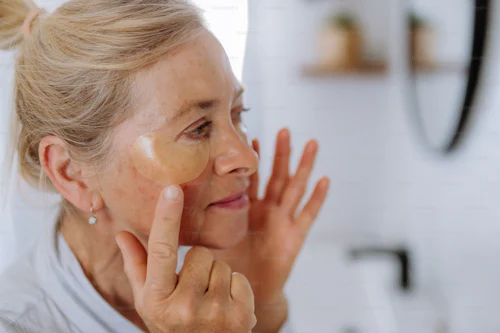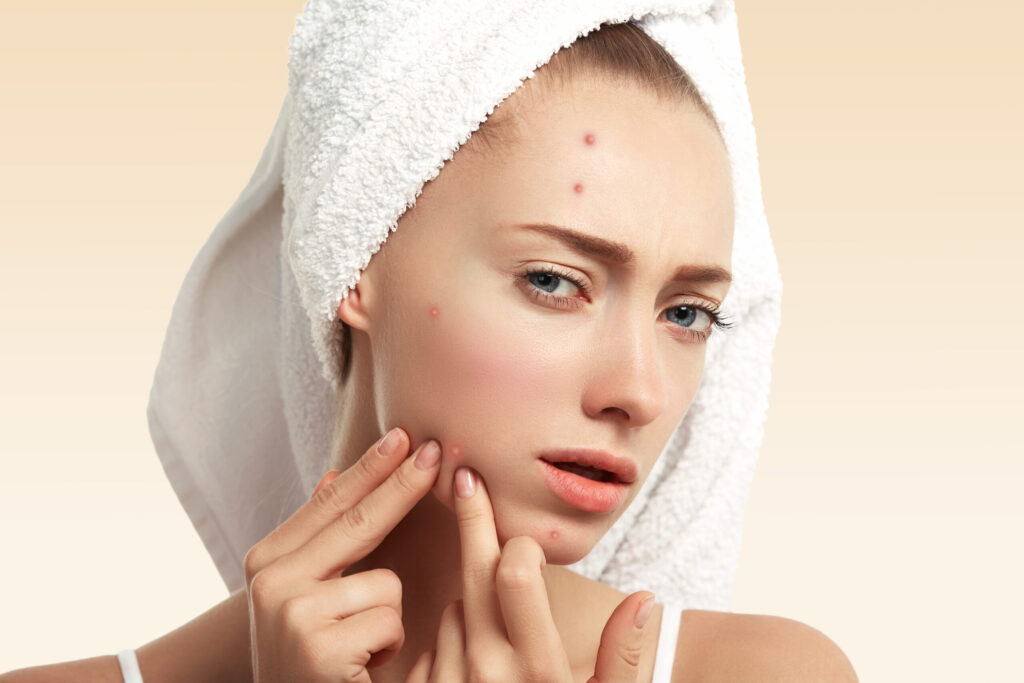Skin aging can be defined as the natural process that your skin is going through as you age. This process is inevitable, and simply a part of growing older. However, there are certain things you can do to slow down the process or help improve the appearance. Everyone experiences skin aging differently. It all varies based on different factors such as biological and environmental. Some common signs of skin aging are loose skin, wrinkles, and textured skin. Some also experience patches of pigmentation, increased tendency to bruise, and increased transparency due to thinning of the outer and inner layers of the skin.
Skin aging can occur all over the body. The areas where the aging will be most prevalent includes eyelids, neck and armpits. As you will notice these are all places where the skin folds. The most noticeable places will be the thinner skin on your face, due to tendons and blood vessels becoming more visible. For this same reason, aging skin will also be fairly noticeable on the arms.
What is anti-aging skin care?
There are many different products that classifies as anti-aging skin care products. There are different products for different skin types and different needs. It is important to note that every skin care product will have a different effect on each skin type, so what works for someone else may not work for you. It is therefore important to find the right products for your specific skin type.
One of the most important and most common anti-aging skin care products is sunscreen. Ultraviolet (UV) radiation contributes to premature skin aging. Wearing an SPF with a minimum factor of 30, and an optimum factor of 50, will therefore help reduce premature skin aging. Read more about our sunscreens here.
Products containing retinoid does also work as an anti-aging skincare product. For example, you could use a retinol, which is a type of retinoid found in multiple skin care products. This is known for increasing the production of collagen and regenerating blood vessels within the skin, which helps reduce wrinkles and fine lines. Products containing a type of retinoid can also help soften textured areas of the skin, and reduce the appearance of age spots. Read more about our retinols here.

Vitamin C is also a helpful ingredient when it comes to anti-aging effects. Vitamin C helps brighten the skin and provides antioxidant protection. It is essential for production of collagen and protects the skin from damage. It inhibits the enzyme tyrosinase which involves the production of melanin that helps fade hyperpigmentation. It also has anti-inflammatory ingredients reducing redness and enhance the effectiveness of sunscreen. Lastly, it helps improve skin smoothness by promoting cell turnover and collagen production.
Keeping the skin moisturized is also an important step in the anti-aging process, so applying moisturizer every day is crucial to make sure you get the ideal result after using any anti-aging skin care products. Combining this final step with other active ingredients mentioned above, is going to help reduce the appearance of fine lines and wrinkles and maintain a smooth texture.
How to implement anti-aging skincare in your skincare routine
Everyone’s skin care routine is different, and you should make sure that you’re doing what’s best for your skin type. Implementing anti-aging skin care products in your routine is not necessarily complicated. If you already have a skincare routine, you have most likely implemented some of the steps already. Firstly, it is important to keep your skin clean by cleansing your face one to two times a day. In addition to this, always apply sunscreen in the morning, especially if you are using products containing retinoid. Another important step to remember in order to maximize the anti-aging products is moisturizer. Always apply moisturizer in both the morning and evening.
It is also crucial to keep your routine regularly and find the products that are most effective to your skin. By keeping your routine regularly, you do not only achieve the anti-aging effect, but you also enhance the effectiveness of the products, improve the skin barrier, prevent skin issues such as breakouts and dryness, you create a stable and more predictable skin condition.

When you should start using anti-aging cream
It is never too early and never too late to start taking care of your skin. The production of collagen is starting to decrease in your early to mid-twenties onwards. The first signs of your skin aging such as fine lines and wrinkles tend not to appear until the mid- to late-twenties. The aging process develops in stages and is therefore gradual. After fine lines and wrinkles in the areas around your mouth and eyes, you may start to notice a loss of firmness due to the decrease in collagen and elastin production.
Over time, the loss of collagen will decrease overall skin volume, which will be more noticeable around the age of 40. In your 50s, you may begin to notice that your complexion has dulled. This is a result of a decrease in cell turnover. This can make your wrinkles appear deeper, and make your skin dryer to the touch. At this age, the areas that are frequently exposed to the sun may start to experience hyperpigmentation or age spots. As previously mentioned, it is never too late, nor too early to start taking care of your skin. But if you want to optimize your skincare when it comes to anti-aging products, ideally you should start implementing such products in your early- to mid-twenties.




